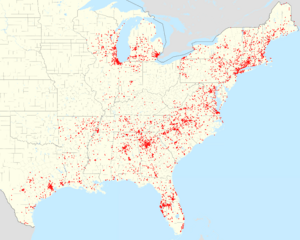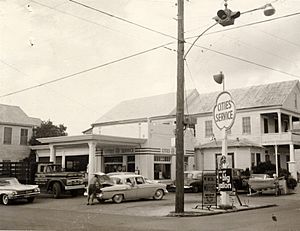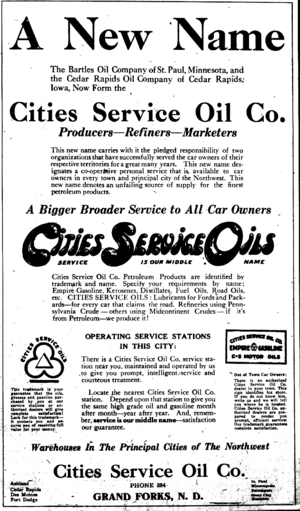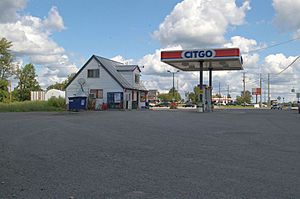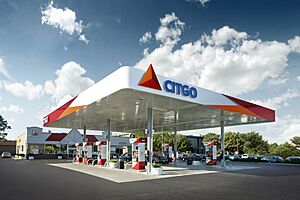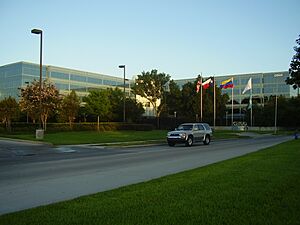Citgo facts for kids
 |
|
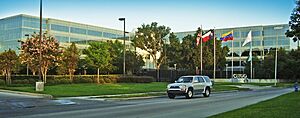
Citgo's headquarters in Houston, Texas.
|
|
| Private | |
| Industry | Oil and gasoline |
| Founded | 1910 in Bartlesville, Oklahoma, U.S. |
| Headquarters | Houston, Texas, U.S. |
|
Key people
|
Carlos E. Jordá (CEO) |
| Products | Fuels, lubricants and petrochemicals |
| Revenue | US$24.113 billion (2021) |
| US$305 million (2024) | |
| Owner | Petróleos de Venezuela, S.A. |
|
Number of employees
|
3,400 (2020) |
Citgo Petroleum Corporation, often called Citgo, is a company based in the United States. It refines, transports, and sells fuels for cars, trucks, and planes. Citgo also sells lubricants and other industrial products.
Its main office is in Houston, Texas. Citgo is mostly owned by PDVSA, a company from the Venezuelan government. However, because of rules put in place by the U.S. government in 2019, Venezuela no longer gets money from Citgo.
Contents
Citgo's Journey Through Time
How Citgo Began: The Cities Service Years
Citgo's story started over 100 years ago, in the early 1900s. A smart businessman named Henry Latham Doherty founded a company called Cities Service Company in 1910. His goal was to provide gas and electricity to small towns.
He started by buying land where natural gas could be found. Then, Cities Service built a system of pipelines to move the gas. They also bought companies that distributed gas to homes. This made it easier and cheaper to get gas to people.
In 1931, Cities Service built a very long pipeline. It stretched 1,000 miles from Amarillo, Texas to Chicago. This was the first long-distance, high-pressure natural gas pipeline in the country.
The company also got into the oil business. They found large oil fields in Kansas in 1914 and 1915. Later, a part of Cities Service found the Oklahoma City oil field in 1928. This was one of the biggest oil fields in the world at that time.
Cities Service also sponsored popular radio shows called Cities Service Concerts. These shows were on NBC radio from 1925 to 1956.
In 1935, a new law called the Public Utility Holding Company Act of 1935 was passed. This law made Cities Service choose between its utility businesses (gas and electricity) or its oil and gas businesses. Cities Service decided to stay in the oil business.
During World War II, Cities Service helped the war effort. They built a large refinery in Lake Charles, Louisiana. This plant made a special kind of gasoline for airplanes. It produced enough fuel for 1,000 bomber flights every day.
Over the years, Cities Service grew into a big oil and gas company. Its green circle logo became well-known across the country. In 1965, the company started using the "CITGO" brand name for its gas stations and oil products.
The Change to Citgo Petroleum Corporation
In 1982, another company tried to buy Cities Service. Cities Service fought back by trying to buy the other company. This was a new way to defend against takeovers.
Eventually, Cities Service was bought by Occidental Petroleum Corporation in 1982. Occidental Petroleum didn't want to keep the gas station and refining parts of Cities Service. So, they created a new company called Citgo Petroleum Corporation.
In 1983, Citgo and its brand names were sold to Southland Corporation. Southland Corporation was the original owner of the 7-Eleven convenience stores.
Venezuelan Ownership of Citgo
In 1986, Petróleos de Venezuela, S.A. (PDVSA) bought half of Citgo. By 1990, PDVSA owned all of Citgo. This meant that Citgo became part of Venezuela's state-owned oil company.
For a while, PDVSA controlled a large part of the U.S. oil market through Citgo. This created a strong link between Venezuelan oil and American customers.
In 2010, the Venezuelan President at the time, Hugo Chávez, said he wanted to sell Citgo. He thought it was not making enough money. However, PDVSA could not find a buyer for the price they wanted. In 2015, it was decided that Citgo would not be sold. Instead, Citgo sold bonds to give money to PDVSA.
In 2016, Venezuela used 49.9% of Citgo as a guarantee for a loan from a Russian oil company called Rosneft. Some people in the United States were worried about this. They thought it could be a risk to U.S. national security if Russia ended up owning part of Citgo.
In November 2017, six Citgo executives were arrested in Venezuela. Five of them were American citizens. They were held in prison for a long time without a trial. In March 2022, one of the executives was released. On October 1, 2022, the remaining five were also released as part of a prisoner exchange.
Challenges in Venezuela and Citgo
Since 2013, Venezuela has faced many economic problems. These problems were caused by lower oil prices and international rules called sanctions. The economy struggled, leading to high prices, shortages, and increased poverty.
Because of these financial difficulties, Venezuela's debt to countries like China and Russia grew. In 2016, Venezuela offered Citgo as a guarantee for its debt to Russia. This meant that if Venezuela couldn't pay its debt, Russia could potentially gain ownership of Citgo.
In July 2018, the president of Citgo at the time, Asdrúbal Chávez, was told to leave the United States.
U.S. Sanctions in 2019
On January 28, 2019, the U.S. Government put sanctions on PDVSA. This meant that PDVSA's money in the U.S. was frozen. U.S. companies and citizens were also not allowed to do business with PDVSA.
In February 2019, Citgo stopped sending payments to PDVSA. The sanctions made it harder for Citgo to manage its own money. However, in March, several financial groups helped Citgo get a $1.2 billion loan. This loan helped Citgo continue its daily operations in the U.S.
Citgo's Financial Situation
In 2020, Citgo borrowed money by selling a bond. They used 50.1% of the company's value as a guarantee for this loan. If the loan is not paid back, the investors who lent the money could become owners of that part of Citgo.
In May 2024, there were reports that some leaders of PDVSA were thinking about a special legal process called Chapter 11 bankruptcy for Citgo. This could help them keep control of Citgo, which is a very important asset for Venezuela.
Legal Actions Against Citgo
On May 30, 2024, two former Citgo executives who had been imprisoned in Venezuela sued Citgo. They claimed that their imprisonment was unfair and that Citgo did not protect them.
Citgo's Refinery Locations
Citgo has refineries in these places:
- Lake Charles, Louisiana
- Corpus Christi, Texas
- Lemont Refinery, Romeoville, Illinois
Past Refineries
Citgo also used to have a refinery in Linden, New Jersey. This plant had several large fires and explosions over the years.
Other Brands Citgo Owns
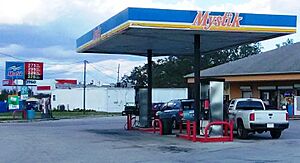
Besides its own Citgo brand, the company also owns the Clarion and Mystik brand names. These brands are mainly known for lubricants. Since 2003, Mystik has also been used as a brand name for retail products.
Citgo's Sponsorships
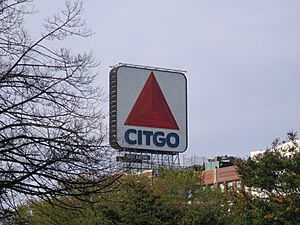
Citgo has supported many motorsport events. For many years, they sponsored the No. 21 Wood Brothers racing team in NASCAR. Famous drivers like Michael Waltrip and Dale Jarrett drove for this team.
Citgo also sponsored Venezuelan race car driver Milka Duno in the Rolex Sports Car Series. She achieved great success, including finishing second at the 2007 24 Hours of Daytona. Citgo continued to sponsor her in the IndyCar Series.
Citgo is a big supporter of Bassmaster Fishing Tournaments. They also sponsor a charity golf tournament that helps the Muscular Dystrophy Association (MDA). Citgo has been MDA's biggest company sponsor for a long time.
A large Citgo sign in Boston is very famous. It overlooks Fenway Park, the home stadium of the Boston Red Sox baseball team. This sign is so well-known that similar signs have been put up at other baseball parks.
Donation for a Presidential Inauguration
Citgo donated money for Donald Trump's presidential inauguration. This is a public record with the U.S. Federal Election Commission.
Simón Bolívar Foundation
In 2006, Citgo started the Simón Bolívar Foundation (SBF). This is a non-profit organization that helps people. Its goal is to improve lives by supporting health programs.
In 2020, the SBF gave $1 million to help people in Venezuela. The foundation also has a program to help Venezuelan cancer patients travel to other countries for important medical treatments.
Citgo's Headquarters
Citgo's main office is in the Energy Corridor area of Houston, Texas.
Before moving to Houston, Citgo's headquarters were in Tulsa, Oklahoma. In 2003, the governor of Oklahoma tried to convince Citgo to stay. But in 2004, Citgo announced it would move to Houston.
The company needed a large office space for its 700 employees. They looked at several buildings in Houston. In June 2004, Citgo signed a lease for a building in the Energy Corridor. By September 2004, they had already moved 150 employees to the new Houston office.
See also
 In Spanish: Citgo para niños
In Spanish: Citgo para niños
- Brands of gasoline
- Oil reserves in Venezuela
 | Kyle Baker |
 | Joseph Yoakum |
 | Laura Wheeler Waring |
 | Henry Ossawa Tanner |


